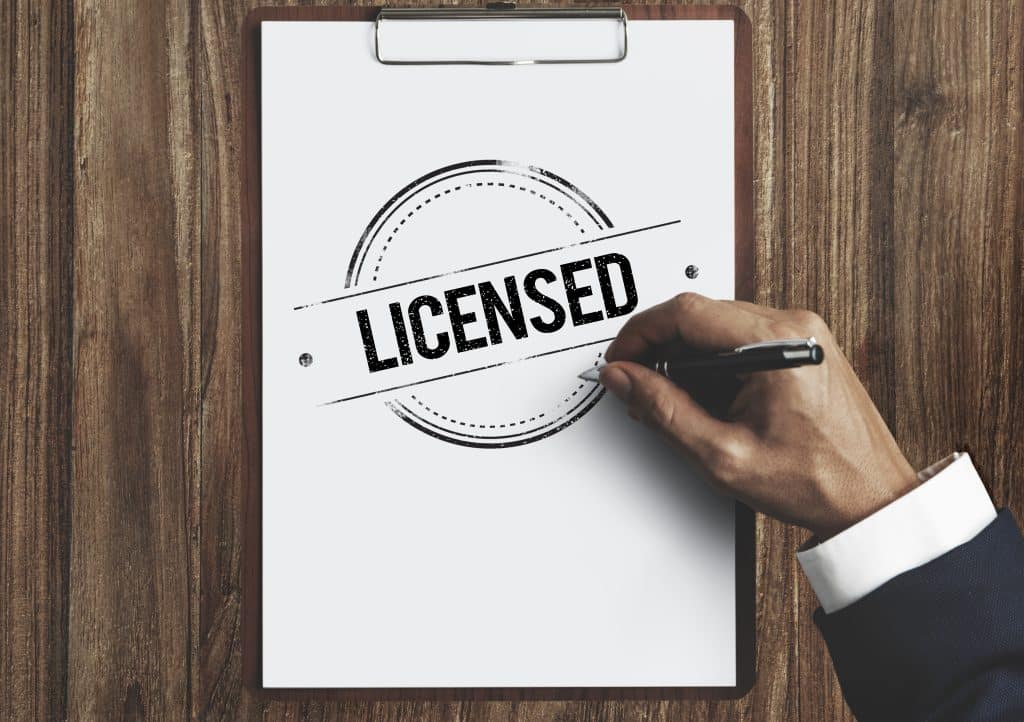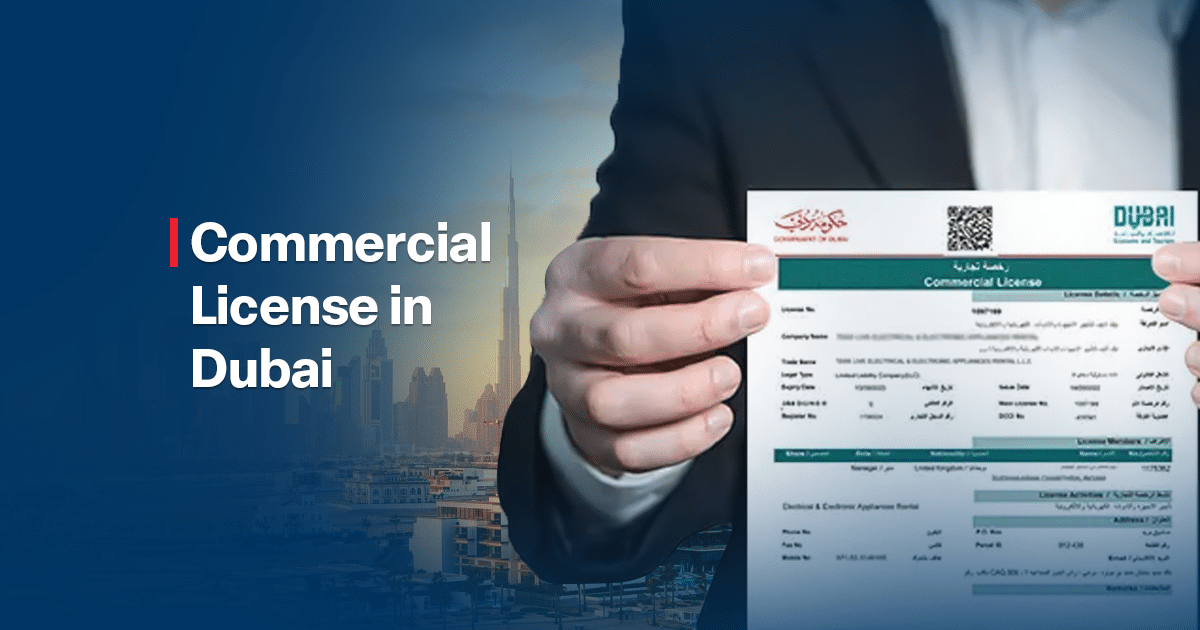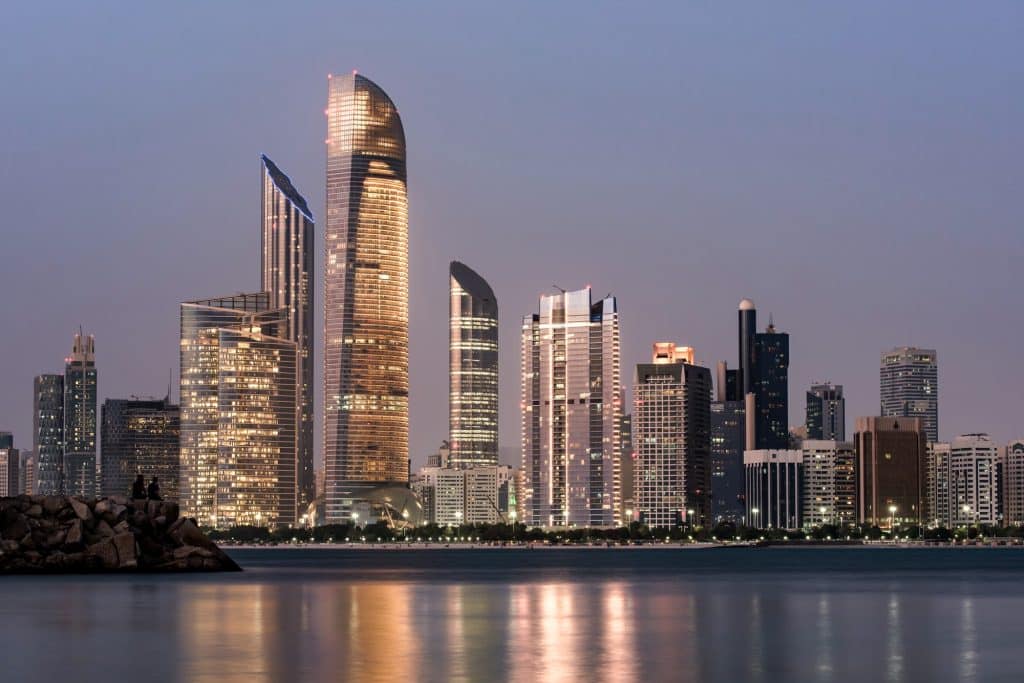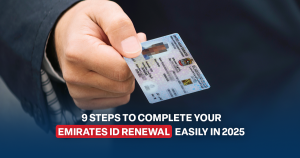Commercial License in Dubai: Want to join the 87,000+ entrepreneurs who started their business journey here in 2023? According to the Dubai Department of Economy and Tourism, Dubai hit a record-breaking 55% jump in new business licenses last year. Feeling stuck about where to start? Don’t worry—we’ve broken down the whole process into 13 simple steps that make sense. Plus, did you know some licenses get approved in just 5 days? Let’s walk through exactly what you need to do. Ready to learn more? Keep reading!
|
Table of contents
|
What is a Commercial License in Dubai?
A commercial license in Dubai is essential for trading, buying, and selling goods or services legally. Issued by the Dubai Department of Economic Development (DED), it enables businesses to import, export, and operate locally and internationally. Suitable for traders, wholesalers, and logistics companies, it also supports visa applications for owners and staff. Renewal is required annually. With Dubai’s strategic location and vibrant market, securing this license positions businesses for growth and legal compliance.
What Are the 16 Key Benefits of Having a Commercial License in Dubai?
1. Legal Compliance
A commercial trade ensures your business operates legally, protecting you from fines and penalties while securing trust.
2. Trade Freedom
Conduct local and international trade seamlessly, including the import, export, and sale of diverse goods and services.
3. Access to Dubai’s Markets
Tap into one of the world’s most dynamic and diverse business hubs, offering endless opportunities for growth.
4. Tax Advantages
Benefit from Dubai’s favorable tax environment, including zero corporate and income taxes in free trade zones.
5. Visa Sponsorship
Easily sponsor visas for employees, investors, and family members, simplifying residency and workforce management.
6. Corporate Bank Account
Open a business bank account with ease, ensuring secure and streamlined financial transactions.
7. Flexible Office Solutions
Choose from prime office spaces, including cost-effective flexi-desks in free zones, tailored to your business needs.
8. Simplified Customs Procedures
Enjoy efficient customs processing for goods, reducing delays and facilitating smoother trade operations.
9. Reputation and Credibility
Enhance your business’s credibility, attracting trust from clients, partners, and investors.
10. Diverse Business Activities
Carry out up to ten different business activities under one license, offering flexibility and growth opportunities.
11. Workforce Expansion
Secure work visas for foreign employees effortlessly, enabling you to build a diverse and skilled team.
12. Market Expansion
Use your license to expand operations across other Emirates or regions, broadening your business footprint.
13. Investment Attraction
A licensed business is more likely to attract investors, providing legitimacy and confidence in your venture.
14. Profit Repatriation
Repatriate earnings to your home country without restrictions, a major benefit of free trade zone operations.
15. Global Networking Opportunities
Connect with international business communities, suppliers, and potential investors to grow your reach.
16. Government Support
Access government initiatives and programs designed to support licensed businesses in Dubai.
By obtaining a commercial license in Dubai, you discover countless advantages that fuel growth, streamline operations, and position your business for success in a competitive global market. Taking this step ensures credibility, compliance, and access to one of the most thriving business ecosystems in the world.
How to Get a Commercial License in Dubai in 13 Easy Steps?
1. Choose Business Activity
Decide on the type of business you’ll be operating. Ensure it aligns with activities allowed under a commercial license.
2. Choose a Trade Name
Give your company a distinctive trade name. Check compliance with naming regulations set by the Dubai Department of Economic Development (DED).
3. Prepare Documents
Gather required documents such as passport copy, residence proof, and a business plan. Ensure everything is accurate.
4. Obtain Initial Approval
To obtain initial approval, apply for the DED. This step confirms that you can proceed with your business setup.
5. Secure Office Space
Lease a physical office space in Dubai. This is mandatory for your license application.
6. Submit Application
File your application with the DED, either online or in person. Include all necessary documents.
7. Pay Fees
Pay the required fees for the commercial license. The size and nature of your business determine the fees.
8. Obtain Your License
You will be granted your commercial license, which will enable you to do lawful business in Dubai, upon approval.
9. Apply for Visas
Submit applications for both your employees and your visas. This step is crucial for hiring staff.
10. Register for VAT if necessary
Tax on Value Added (VAT) Registration
11. Create a bank account
To conduct business, open a corporate bank account.
12. Comply with Regulations
Ensure compliance with local regulations to avoid penalties.
13. Renew Annually
Renew your commercial license every year to maintain legal business operations.
By following these steps, you can set up your business quickly and legally in Dubai. Always consult the DED website for detailed guidelines. Consequently, consulting a business advisor can streamline the process and ensure compliance. With these steps, you’ll be trading in Dubai’s dynamic market smoothly.

What Are the 15 Documents Needed for a Commercial License in Dubai?
1. Passport Copy
Provide clear copies of the passport information pages for all business partners. Ensure they are valid and legible.
2. Emirates ID Copy
Include a copy of the Emirates ID for UAE residents. This is critical for residency verification.
3. Visa Copy
For residents, provide a copy of your valid residence visa. If applicable, include entry stamps for visitors.
4. Proof of Address
Submit a recent utility bill, tenancy contract, or Ejari certificate as evidence of your business location or residence.
5. Business Plan
Prepare a concise business plan. Highlight your activities, market analysis, and financial goals to demonstrate preparedness.
6. Trade Name Reservation
Secure your trade name approval from the Dubai Department of Economic Development (DED) to ensure no conflicts.
7. Initial Approval Certificate
Ask the DED for a certificate of initial approval. In the licensing procedure, this is an essential first step.
8. Memorandum of Association (MOA)
If your business requires a local partner, draft an MOA outlining the ownership structure and roles.
9. Tenancy Contract
Provide a valid tenancy agreement for your physical office space. This document is mandatory for license approval.
10. Ejari Registration
Register your tenancy contract with Ejari to validate your office lease. This ensures compliance with local regulations.
11.No Objection Certificate (NOC)
If you’re employed, get an NOC from your current employer or sponsor to proceed.
12. Bank Reference Letter
Submit a reference letter from a UAE-based bank to demonstrate financial stability, if required.
13. Power of Attorney (POA)
If someone else is managing the process on your behalf, provide a legally attested POA.
14. Additional Permits
Depending on your business activities, extra approvals may be needed from specific authorities, like health or safety permits.
15. Shareholder Information
Include passport and visa copies for all shareholders or partners involved in the business.
Ensure all documents are clear, up-to-date, and properly attested to avoid delays.
Regulations can vary, so always check the DED website for the most recent requirements.
Consider consulting a professional business advisor to streamline the process and ensure compliance.
By organizing these documents in advance, you’ll ensure a smooth application process for your commercial license in Dubai, helping you establish your business in the city’s dynamic market.
How to Get a Commercial License in Dubai Free Zone: 13 Steps
1. Select the Right Free Zone
Research available free zones to find the one that aligns with your business type. Each free zone offers a specific Verify that they follow the rules of what can be done in the free zone of your choice.
2. Define Your Business Activities
Identify the activities your business will perform. Make sure they adhere to the activities that are allowed in the free zone of your choice.
3. Pick a Unique Business Name
Choose a name that represents your business. Make sure it adheres to the naming guidelines set by the free zone authority and is not already registered.
4. Gather Required Documents
Prepare essential documents, including:
- Application for a license (containing details about Ultimate Beneficial Ownership)
- A clear copy of your passport.
- A digital passport photo.
- Emirates ID and visa copy for UAE residents.
- A succinct plan outlining your objectives and organizational structure.
5. Submit Initial Application
File an online application with the free zone authority. Provide preliminary details about your business, such as activities and shareholders.
6. Secure Office Space
Rent a physical office or opt for a flexi-desk solution offered by the free zone. This step is mandatory for license issuance.
7. Draft a Memorandum of Association (MOA)
For businesses with partners, prepare an MOA outlining the ownership structure, responsibilities, and operational guidelines. Legal advice may be helpful here.
8. Obtain Initial Approval
Send your application to the free zone authority for preliminary approval. This step confirms your business activities and that your name is permissible.
9. Pay the Necessary Fees
Settle the required fees for license issuance. Costs vary based on business type, size, and the number of visas requested.
10. Collect Your License
Once the application is approved, receive your commercial license. The soft copy will be sent via email, and the original can be collected from the free zone office.
11. Open a Business Bank Account
Use your license to open a corporate bank account for all financial transactions. Choose a bank offering tailored services for free zone businesses.
12. Apply for Visas
Submit visa applications for yourself and your employees through the free zone’s streamlined visa process.
13. Ensure Regulatory Compliance
Adhere to the free zone’s specific guidelines and UAE laws to avoid penalties. Regularly review updates to stay compliant.
Remember to renew your commercial License Annually to maintain its validity. Timely renewal prevents operational disruptions.
for Success
- Verify all paperwork again for accuracy to prevent delays.
- Regularly consult the official website of your chosen free zone for updated requirements.
- Consider hiring a professional business consultant to navigate the process smoothly and ensure compliance.
By following these steps, you can set up your business effectively and legally in a Dubai Free Zone.
Dubai Commercial License Renewal: 7 Steps for Mainland & Free Zone
For Dubai Mainland
1. Check License Expiry Date
Always note your license expiry date and begin the renewal process at least one month in advance. Avoid penalties for delays.
2. Renew Ejari Registration
Update your Ejari-registered tenancy contract to ensure it remains valid for the upcoming license period.
3. Prepare Required Documents
Collect key documents such as your current trade license, Ejari certificate, passport copies, and Emirates ID.
4. Clear Pending Fines
Settle any fines or outstanding dues related to your business with the Department of Economic Development (DED).
5. Submit Renewal Application
Visit the DED service center or use the DED online portal to file your renewal application.
6. Pay Renewal Fees
Pay the prescribed renewal fees based on your business activities and license type.
7. Collect Your Renewed License
After approval, download or collect your updated commercial license, allowing you to operate legally in Dubai mainland.
For Dubai Free Zone
1. Verify License Expiry
Begin the renewal process well before your license expires. Free zone authorities recommend starting at least 30 days in advance.
2. Update Lease Agreement
Renew your lease agreement or flexi-desk contract with the free zone authority. Ensure this document is current.
3. Gather Renewal Documents
Provide essential documents, including a copy of your existing trade license, Emirates ID, passport, and any required business approvals.
4. Settle Outstanding Payments
Pay any pending fines, license fees, or additional charges owed to the free zone authority.
5. File Renewal Application
Use the free zone authority’s online platform or visit their office to submit your renewal application.
6. Pay Applicable Fees
Pay the renewal charges based on your license type, activities, and business package.
7. Receive Updated License
Once approved, collect your renewed commercial license from the free zone office or receive a soft copy via email.
Starts early and always initiates the renewal process ahead of time to avoid disruptions or penalties.
By diligently following these steps, you can ensure a seamless renewal process for your trade license in Dubai, maintaining uninterrupted business operations in either the mainland or a free zone.
Professional License vs. Commercial License in Dubai: Key Differences and Which One Fits Your Business?
Understanding the differences between a professional license and a commercial license in Dubai is essential for choosing the right path for your business. Each license serves specific needs, offering distinct advantages depending on the nature of your operations.
|
No. |
Aspect |
Professional License |
Commercial License |
|
1 |
Business Activities |
|
|
|
2 |
Ownership |
|
|
|
3 |
Liability |
|
|
|
4 |
Office Space |
|
|
|
5 |
Visa Sponsorship |
|
|
|
6 |
Tax Benefits |
|
|
|
7 |
Cost Differences |
|
|
|
8 |
Market Access |
|
|
|
9 |
Renewal Process |
|
|
|
10 |
Example Activities |
|
|
|
11 |
Best For |
|
|
A Professional License is ideal for service-oriented businesses looking for simplicity, cost efficiency, and flexibility. On the other hand, a Commercial License in Dubai is designed for trading companies aiming for broader market access, more visas, and operational growth.
Choosing the right license depends on your business model, future goals, and operational needs.
Dubai Commercial License: What Businesses Can You Run?
A commercial license in Dubai offers a gateway to diverse business opportunities, making it essential for companies aiming to operate legally and grow in one of the world’s most dynamic markets. Here’s a detailed breakdown of the activities allowed:
1. Core Trading Activities
- Import and Export: Legally bring goods into Dubai or ship local products to international markets, a cornerstone of Dubai’s thriving economy.
- Wholesale Trading: Purchase goods in bulk and sell them to retailers or businesses, ensuring a seamless supply chain for various industries.
- Retail Sales: Open physical stores or online platforms to sell products directly to customers, catering to both local and tourist markets.
2. Specialized Trading Activities
- General Trading: Operates across multiple product categories under one license, providing unmatched operational flexibility.
- E-commerce: Establish and run online businesses, managing digital transactions, product deliveries, and customer services efficiently.
- Construction Materials Trading: Supply essential materials like cement, steel, and equipment to support Dubai’s booming construction sector.
3. Niche Markets and Industries
- Healthcare Products Trading: Distribute or sell medical devices, pharmaceuticals, and other health-related goods.
- Jewelry and Precious Metals Trading: Buy and sell gold, diamonds, and luxury items, tapping into Dubai’s reputation as a global hub for precious goods.
- Clothing and Textile Trading: Trade garments, fabrics, and accessories, meeting the high demand in Dubai’s fashion-forward market.
4. Value-Added Services
- Real Estate Services: Buy, sell, lease, or manage properties, leveraging Dubai’s booming real estate industry.
- Food and Beverage Trading: Import and sell food items or beverages, including specialty and international products.
- Logistics and Warehousing: Provide transportation, storage, and distribution solutions to ensure smooth supply chain operations.
5. Diverse Opportunities
- Vehicle and Machinery Trading: Deal in cars, heavy machinery, and spare parts for personal and industrial use.
- Furniture and Home Décor Trading: Trade furniture, lighting, and home improvement products to cater to both residential and commercial needs.
- Stationery and Office Supplies Trading: Supply essential materials for offices, schools, and institutions.
Key Benefits of a Commercial License in Dubai
A commercial trade license Dubai provides unparalleled flexibility, allowing businesses to:
- Operate legally within local and international markets.
- Expand into multiple industries under one license.
- Benefit from Dubai’s tax-free environment and streamlined regulatory framework.
By securing a commercial license in Dubai, businesses gain access to an array of lucrative opportunities across various sectors. Always consult the Dubai Department of Economy and Tourism (DET) or specific free zone authorities to ensure compliance and select the right activities tailored to your business goals.
The Summary
Ready to get your Commercial License in Dubai and start your business journey? With expert support from Business Link, the process is easier than you think. Our team simplifies every step, from paperwork to approvals, saving you time and effort. Don’t wait—tap into Dubai’s thriving market today. Contact Business Link now and take the first step toward building your dream business in Dubai today and discover the door to countless opportunities. Contact us now via phone at +97143215227, WhatsApp at +971502052735, or email at info@businesslinkuae.com. For assistance.
FAQ’s
What Is the Price of a Dubai Commercial License?
The cost of a commercial license in Dubai varies depending on factors such as the business activity, office space, and number of visas required. On average, costs range from AED 10,000 to AED 30,000 annually. Additional fees may apply for trade name registration and approvals.
Who Needs a Commercial License in Dubai?
Any business involved in trading goods or commodities needs a commercial license in Dubai. Whether you’re running a retail shop, an e-commerce store, or an international trading company, this license is mandatory for legal operations. It’s especially important for companies aiming to expand globally or operate within Dubai’s free zones.
What main documents are needed for a Commercial License in Dubai?
You’ll need your passport, visa copy, a business plan, and a tenancy contract. Also, you might need a No Objection Certificate (NOC) if you’re currently employed. In addition, you will need the initial approval.
Can I Operate a Business in a Free Zone With a Commercial License in Dubai?
Yes, you can. Free zones in Dubai offer specialized commercial licenses tailored to specific industries, such as technology, healthcare, or logistics. These licenses come with added benefits like 100% foreign ownership, tax exemptions, and simplified customs processes. Popular free zones include Dubai Multi Commodities Centre (DMCC) and Dubai South.





